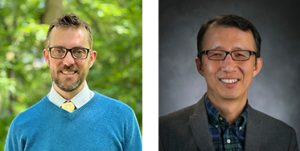For early childhood educators, engaging in creative and professional writing, particularly in a small group, can promote personal and professional development, according to a new study co-authored by the School of Education’s Emily Machado.

The study, published in the American Educational Research Journal, focused on how writing might support educators in preschool through third grade classrooms as they sought to process and center themes of social justice teaching. It found that creating a sustained, small group community that engaged in professional and personal writing led to fresh and reinvigorated approaches to lessons, classroom management, and parent outreach.
“We found that the teachers’ writing forwarded and began to enact a pedagogy that interrogated dominant narratives, redistributed power, and centered joy and repair,” the study’s co-authors wrote.
Machado, an assistant professor in the Department of Curriculum and Instruction, co-authored the study with Maggie Beneke and Jordan Taitingfong of the University of Washington.
The researchers focused on early childhood educators because of the particular weight those educators bore during the height of the COVID-19 pandemic and the social and political tensions of recent years.
“Early childhood teachers and caregivers have been particularly affected by these crises as they have navigated program closures, abrupt changes in their working conditions, and increased demands for their labor during a global pandemic, uprisings for racial justice, political turmoil, and other intersecting events,” they wrote.
Throughout the study, the educators worked individually and collaboratively to write creative essays, poems, lesson plans, and letters to students’ families.
“As they composed in community, the teachers found ways to center their values in their teaching and leadership, and begin to bring their liberatory pedagogical visions into the present,” the researchers wrote.
Paper looks at campus belonging for student military, veterans in STEMM

Supported by NSF grants totaling close to $2 million since 2019, WCER researchers Ross Benbow and You-Geon Lee have published new research exploring the social support and campus belonging of student military service members and veterans (SSM/Vs) in science, technology, engineering, mathematics, and medical (STEMM) fields.
Ross Benbow and You Geon-Lee are studying how student military and veterans can use social ties to excel in STEMM fields.Despite SSM/Vs being one of the fastest-growing groups of nontraditional students in American universities in recent years and their potential to diversify STEMM fields, little prior research has charted the academic development and success of these unique students across university STEMM contexts, Benbow and Lee say.
In an extension of Benbow’s WCER-based VETWAYS project, the findings of the new paper start to fill that knowledge gap using social capital theory to “explore links between STEMM SSM/V social support and a sense of campus belonging… within four-year campus communities.”
Published in the Journal of College Student Development, the paper notes campus belonging and social support have been shown to be important to achievement among marginalized college students. But few studies have closely explored such relationships among SSM/Vs.
Fields works toward better training, preparation for family care partners of dementia patients
As shortages in home health care workers continue across the country, a UW–Madison School of Education assistant professor is working to help family and other non-professional care partners safely and successfully care for people living with dementia at home.
According to the Alzheimer’s Association, the number of Americans living with dementia is expected to triple by 2050. At the same time, a shortage of medical professionals who can provide specialized care at home isn’t expected to improve.
In response, Beth Fields, an assistant professor in the School of Education’s Department of Kinesiology, is developing a screening tool that will help care partners of people living with dementia let hospital staff know what support and training they need to succeed before their loved one is discharged from the hospital.
Mindfulness researchers outline effects of pandemic on educators’ mental health
A study led by School of Education alumnus Matthew Hirshberg was among the first to collect data on educators’ mental health during the pandemic. It found about 78 percent of school employees reported clinically meaningful levels of anxiety and nearly 54 percent reported clinically meaningful depressive symptoms. Simon Goldberg, an assistant professor in the Department of Counseling Psychology, co-authored the study. The team also continues to conduct promising research about the benefits of mindfulness to address these mental health challenges.
Study breaks new ground on how menopause affects brain health
Some health challenges faced by women who go through menopause earlier in life may be because of changes to blood flow in the brain, according to a study led by Erin Moir, a postdoctoral fellow in the Department of Kinesiology. The study found that women who went through menopause in their mid-40s had less responsive blood flow in the brain and more brain lesions associated with cognitive decline than women who went through menopause in their mid-50s.